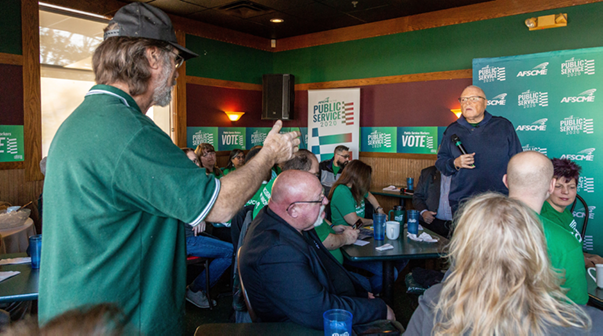If you followed every Democratic presidential primary debate and read the candidates’ positions on every topic and watched the AFSCME Public Service Forum held in August, you might think there is nothing left to know about the men and women vying to be the next president of the United States.
But don’t tell that to the AFSCME members of Iowa Council 61 who participated in Saturday’s “Coffee Caucus” in West Des Moines, hearing from the candidates and their surrogates in a more intimate setting about the issues that matter to them.
For the candidates, it was one remaining opportunity to meet with voters and reach an audience beyond (a live feed of the event has been watched more than 170,000 times on AFSCME’s Facebook page) before Iowa caucusing begins today.
“Every single one of these candidates talks about the importance of unions,” said AFSCME President Lee Saunders, who hosted the event, in answer to an AFSCME member’s question before the candidates and their surrogates began making appearances.
Saunders, joined by Council 61 President Danny Homan, was contrasting the current moment, in which unions are at their highest approval rating in nearly half a century, with circumstances just a few years back, when “you wouldn’t hear the word union come out of politicians’ mouths,” as he put it.
Today, nearly half of nonunionized workers in the nation would join a union if given the chance. That’s because working families everywhere are learning about the union difference, and candidates are paying attention.
The few dozen AFSCME members who gathered at Tavern II, a family restaurant, got to hear directly from candidates Bernie Sanders and Tom Steyer, as well as from representatives of the campaigns of Joe Biden, Pete Buttigieg, Amy Klobuchar, Elizabeth Warren and Andrew Yang.
They asked questions covering collective bargaining rights, health care, student debt relief, education funding, combating privatization or the outsourcing of public sector jobs, and more.
The candidates and their surrogates, each in their own way, made the case that unions have a key role to play in creating an economy that works for everyone. They insisted that the federal government must make it easier, not harder, for workers to form strong unions, and that all public service workers in the country should have the right to negotiate together.
Union members turn out to vote at higher rates than the general public, and AFSCME members at even higher rates than other union members. That’s because AFSCME members are engaged in their communities, and they are sure to make a difference in the upcoming election, which Saunders said is “the most important election of our lifetime.”
AFSCME has yet to endorse a 2020 presidential candidate, choosing instead to encourage contenders to engage with public service workers around the country.
“Whoever wins (the Democratic primary),” Saunders said, “all of us have a responsibility to rally around whoever that person may be because we’ve got to take back the White House.”

